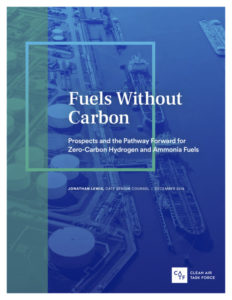A new report from CATF, Fuels Without Carbon: Prospects and the Pathway Forward for Zero-Carbon Hydrogen and Ammonia Fuels, explores how a massive scale-up in the production and use of zero-carbon hydrogen and ammonia might help decarbonize segments of the power sector, the industrial sector, and the transportation sector (both marine and ground). Fuels Without Carbon looks at how the availability of zero-carbon hydrogen and ammonia fuels could help address several vexing climate-energy challenges, and it examines the steps that need to be taken to fully understand and address the safety and environmental risks associated with the two chemicals. Fuels Without Carbon also identifies several public and private sectors initiatives — including a few being pursued by CATF — for analyzing the opportunities and challenges associated with hydrogen and ammonia fuel, educating stakeholders about the potential benefits and risks, designing and advocating for appropriately supportive policies, and engaging with key power and mobility companies.

